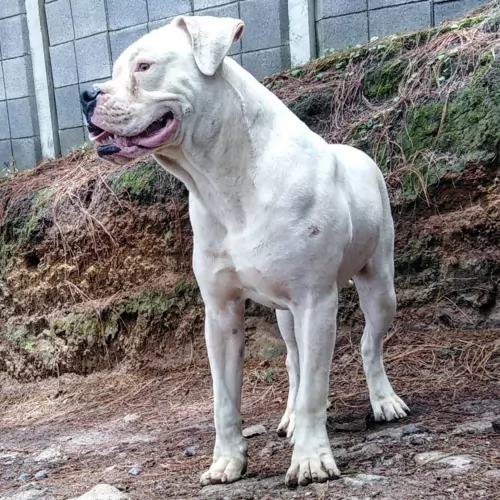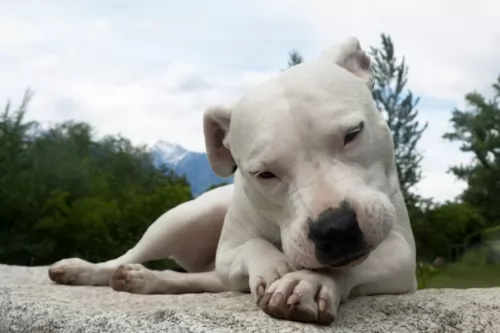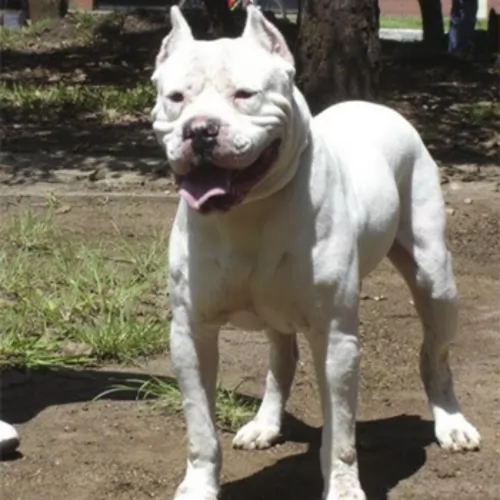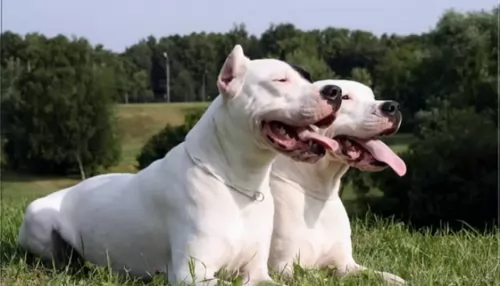 Petzlover
PetzloverCordoba Fighting Dog is originated from Argentina but Dogo Guatemalteco is originated from Guatemala. Both Cordoba Fighting Dog and Dogo Guatemalteco are having almost same height. Cordoba Fighting Dog may weigh 10 kg / 23 pounds more than Dogo Guatemalteco. Both Cordoba Fighting Dog and Dogo Guatemalteco has almost same life span. Both Cordoba Fighting Dog and Dogo Guatemalteco has same litter size. Cordoba Fighting Dog requires Low Maintenance. But Dogo Guatemalteco requires Moderate Maintenance
The Cordoba Fighting Dog is believed to be an extinct dog breed, but research will reveal that there are still those who believe that some of these dogs do still exist.
The dog was regarded as an aggressive, fighting dog and was a crossbreed of the Mastiff, Bull Terrier, Boxer and Bulldog.
Known also as the Argentine Fighting Dog or the Perro de Presa de Cordoba, this dog comes from Argentina where it was used for dog fighting, hog hunting as well as being a guard dog. It is thought that it became extinct in the 20th Century.
Breeders in Cordoba worked at developing a new fighting breed of dog based on the Bull Terrier. The breed became known as the Perro de Presa de Cordoba or Fighting Dog of Cordoba. He resembled the Bull Terrier and came in shades of fawn and brindle, although Argentine fanciers preferred the plain white dogs.
Over breeding for white coated dogs led to skin problems and other health problems, making it that except for fighting, the dog wasn’t in demand elsewhere. As fighting of dogs became more frowned on, the dog became extinct.
 Known as the Guatemalteco Bull Terrier or Guatemalan Molosser, the Dogo Guatemalteco is also known as the Bull Terrier Guatemalteco, Guatemalan Bull Terrier, and Guatemalan Molosser.
Known as the Guatemalteco Bull Terrier or Guatemalan Molosser, the Dogo Guatemalteco is also known as the Bull Terrier Guatemalteco, Guatemalan Bull Terrier, and Guatemalan Molosser.
This big Molosser-type dog originates in Guatemala. In the 20th century, it was known as the Bullterrier Guatemalteco, but at the end of the century, it was changed to Dogo Guatemalteco.
Today, while the dog is kept as a companion dog, most are working guard dogs. The Dogo Guatemalteco isn’t recognized by any major international kennel clubs. However, the Kennel Club of Guatemala has given full recognition to this dog and it was in 1981 that the Guatemalan government named the dog as their national dog breed.
The Cordoba fighting dog is a mixed breed. Bull Terrier, Mastiff and Bulldog make up this dog breed.
He was a large dog, standing at between 58 and 62cm and weighing between 32 to 55 kg. He was lean and muscled with a wide chest and small ears that were cropped. His powerful jaws were to be avoided as once they settled around another dog’s throat, the grip was vice-like. The dog’s coat was short and was essentially white with black marks on the body and around the head.
A Cordoba Fighting Dog is aggressive and strong. While most dogs benefit immensely from training and socialization, these dogs, even with training, remained somewhat aggressive, so they were no doubt not a good choice for first time dog owners, or for those with children in the home. Also the dog was always aggressive towards other dogs.
You could safely say that if these dogs were around today, they would not be looked upon as the ideal family pet.
 The Guatemalteco is a medium to large dog standing at 54 – 60cm and weighing between 40-45kg. He has a short, smooth coat and is essentially white with some black markings on the head.
The Guatemalteco is a medium to large dog standing at 54 – 60cm and weighing between 40-45kg. He has a short, smooth coat and is essentially white with some black markings on the head.
This breed was created from a crossing between a bull terrier, boxer and dalmatian. Some of the dogs are thickly built, while others are more leaner and athletic looking.
The ears of the dog vary quite a bit because while sometimes the ears fold down closely to the head, others are semi-pricked. There are some dog owners who have their dogs ears cropped into fully erect triangular shapes. The eye are small and usually dark brown.
The Dogo Guatemalteco is a fearless, evenly tempered dog. He was bred as a guard dog and he wants to protect his human family, forming a deep bond with them. It makes them difficult to re-home because of this.
It is imperative to have this dog trained and socialized because it might believe its the leader of the pack in your home. He is quite capable of getting along well with children and pets in the home. Because of his dominant nature, he isn’t suited as a pet for the first-time dog owner. He also doesn’t warm easily to strangers.
The Cordoba Fighting Dog was a hunter and also a fighting dog. It was a fierce, aggressive dog, and while he may have formed a bit of a bond with his owner, he wouldn’t have made a good family pet.
With an unstable temperament, who knows when he could have turned on his owner or the owner’s family? Certainly he wouldn’t have tolerated any other pets in the home.
Perhaps it is better if he has become extinct because dog fighting is abhorrent and hopefully being banned today, and he would never have been much good as a family pet.
 Your Dogo Guatemalteco is an intelligent dog breed, and because he is strong-willed and stubborn he might give you a hard time during training. It is possible though and it is important as the training will turn him into an obedient, relaxed dog, able to get on with all his family members, including pets.
Your Dogo Guatemalteco is an intelligent dog breed, and because he is strong-willed and stubborn he might give you a hard time during training. It is possible though and it is important as the training will turn him into an obedient, relaxed dog, able to get on with all his family members, including pets.
He is an energetic dog and will require walks and other forms of exercise each day.
This is certainly not the kind of dog that you buy to protect your property and provide little else for him except food and water. Frustration on the dog’s part can lead to destructive behavior and aggression.
The Cordoba Fighting Dog was a generally healthy breed but even so, its very lifestyle made it want to gobble down his food without much chewing. This possibly resulted in a number of problems such as bloat.
Bloat is a serious condition which the Cordoba had to deal with and which happens with modern day dogs too. It is an ailment not to be taken lightly. Your dog will need to get to the vet as soon as possible. The dog’s stomach fills with gas, which can also result in the stomach twisting.
When the stomach fills with gas, pressure is put on the diaphragm, making it difficult for the dog to breathe. The dog’s abdomen is swollen, he has difficulty with breathing and he will likely be drooling. It is an ailment which can happen to any breed of dog, regardless of age. Larger dog breeds, however are more prone to it.
 This dog can be susceptible to skin allergies. The skin is sensitive and prone to rashes.
This dog can be susceptible to skin allergies. The skin is sensitive and prone to rashes.
Another health concern with this dog because of his white coat, is congenital deafness. The deafness could be in one- or both ears.
The dog could also experience lameness, of which the most common problem is hip dysplasia. Because skeletal problems occur in this breed, it is advisable for owners to have their pet tested by the Orthopedic Foundation for Animals.
The Cordoba Fighting Dog was a short haired dog and no doubt his owner would have given him a brush down every now and then to keep him looking presentable.
The Cordoba was used for fighting to the death with other dogs, so a strong dog like this will have required a high-protein diet. The owners particularly wouldn’t have wanted a dog with hip- and elbow dysplasia and they would have ensured a good choice of raw meat, cooked brown rice and vegetables.
Manufactured dog food started emerging about the mid-1800s and the dogs would have been fed this, made up of wheat meals, meat and vegetables which was then mixed with cooked meat and vegetables.
 The coat of the dog is short and harsh and it sheds throughout the year. While he is still looked upon as a low maintenance dog, regular brushing will be required twice a week.
The coat of the dog is short and harsh and it sheds throughout the year. While he is still looked upon as a low maintenance dog, regular brushing will be required twice a week.
Because he is a dog breed that is susceptible to skin allergies, bathing isn't necessary as it removes the dog’s natural oils.
Other areas of grooming for this dog are brushing his teeth twice a week, trimming his nails and checking his ears.
Always choose a high quality dog food for your Dogo Guatemalteco and look at the feeding recommendations on the packaging.
When you feed your pet kibble, you can also mix in some cooked brown rice, vegetable and chicken for variety and contentment.
Raw meat is also advised from time to time. Don’t just go on and on through the years feeding your dog the same amount of food, as there are factors to take into account when deciding on food quantity. The age of your dog, it’s stage of life and its activity levels will mean regulating your pet’s food to match his needs.